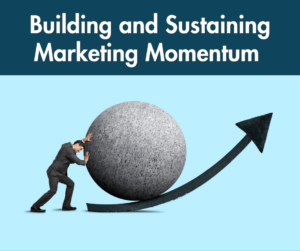Building and Sustaining Marketing Momentum for Small Business Success
Building marketing momentum can feel very similar to starting a new fitness regime, with the hopes of getting stronger or losing weight. In the first week, the workouts are exhausting, the controlled diet is difficult to stick to, and the overall experience hasn’t really shown its benefits yet. A few weeks in, the workout are becoming more doable, and the diet is easier to stick to, and yet…are the true benefits revealing themselves?
A few months on, yes you are feeling stronger, and you may have shed a few kilos, but you have yet to reach your goal. So, you ask yourself: Was all that effort over the past 2 months’ worth it? How long do I have to keep this up to see the benefits I desire? And very often, your drive, focus and discipline starts to fade.
Much like the principle in physics, where a significant amount of force is needed to set an object in motion but less is required to keep it moving, the same applies to marketing. Exposure acts as the force in marketing, and once momentum is built, maintaining it requires less effort.
The Foundation of Marketing Momentum
Execution and Consistency
The biggest factor in building momentum for marketing is execution. You won’t see results from things you don’t do. If you want to build momentum, you need to get things done. This means following through on the marketing activities laid out in your marketing plan, on time.
The second biggest factor in building momentum is consistency. To stay in motion, you have to keep executing. Starting and stopping will not build momentum. This means having a plan in place to keep your marketing in motion during peak business periods.
Commitment and Patience
As the saying goes, “Rome wasn’t built in a day”.
Building momentum in your marketing is not going to bring in instant results, especially if you are working with a limited budget. Realistically, results will not start to show until a minimum of 3 to 6 months in. It is crucial that you persevere in your marketing plan, knee-jerk reactions like stopping your plan or starting a new one without fully understanding how to improve on the current plan is simply a waste of your time and your money.
Focus and Adaptability
Not everything will be a roaring success. Focus on what is working well and figure out what isn’t working and why. Having the freedom and flexibility to test different marketing activities means having more than one tool in your toolbox and keeping calm and carrying on when something doesn’t work the way you thought it would. Building marketing momentum isn’t about throwing paint at the wall to see what sticks. Strategy still applies here. Focus on strategic, high-priority activities for your business.
Maintaining Marketing Momentum After Success
When you’re running a marathon, the first few miles are always the hardest. You have to get over the initial hurdle of getting started and keep your pace going. The same is true for marketing campaigns. It’s often difficult to get things off the ground, but it’s even more important to maintain momentum once you’ve achieved success.
Importance of Continuous Effort
If you have a successful campaign, don’t rest on your laurels! Use this success as fuel to keep pushing forward – creating more campaigns and furthering your reach. If you stop marketing after having a successful launch, customers may become apathetic and forget about your brand or product. This will lead to a decrease in revenue and a slower return on your initial investment.
Strategies for Sustaining Momentum
It is important to take the necessary steps to ensure that your success doesn’t wane after a campaign. Here are some tips for keeping the momentum going:
- Celebrate Your Success – But Don’t Get Complacent: Celebrate your success but stay focused on future goals.
- Analyse What Went Well and What Could Be Improved: Evaluate the results of your campaign and use that information to inform your next steps.
- Plan for the Next Phase: Set new goals, identify target audiences, and outline tactics for your next campaign.
- Reinvest and Refocus: Use some of the revenue from your successful campaign to fund new initiatives, creating a cycle of continuous improvement.
- Implement Changes and Track Results: Put your new plan into action and monitor its progress, making adjustments as necessary.
- Evaluate and Adjust Goals: Continually refine your strategy based on what you learn from each campaign.
Final Thoughts
By building a solid foundation, executing consistently, and maintaining momentum through strategic planning and continuous effort, small businesses can achieve long-term success. Celebrate your achievements, learn from each campaign, and keep pushing forward.
When I write about this subject, it comes from my personal experience of having walked this path. I know all too well about the highs and the lows that come with running a small business, the challenges to overcome, the risk of investing time and money, and the fear of failure. And what I know is that as difficult and scary as it can be, that feeling of succeeding, and seeing the desired results in the long run is one of the best experiences I have had in my life. I know exactly what it feels like when you are not yet seeing the benefits from your marketing plan, and I have learned from my experiences that patience, focus and commitment do really ensure that you reach your goal.
I have also learned the hard way that losing all that momentum after reaching success is much like loosing all the muscle you built, and regaining the weight you may have lost. It is far more difficult to start again from scratch, than it is to maintain that momentum. I am here to support you as a business owner in achieving your marketing goals, so please feel free to reach out to me if you need feedback or support!
Talk to Me Today: https://ifinfinite.co.za/digital-marketing-agency/






